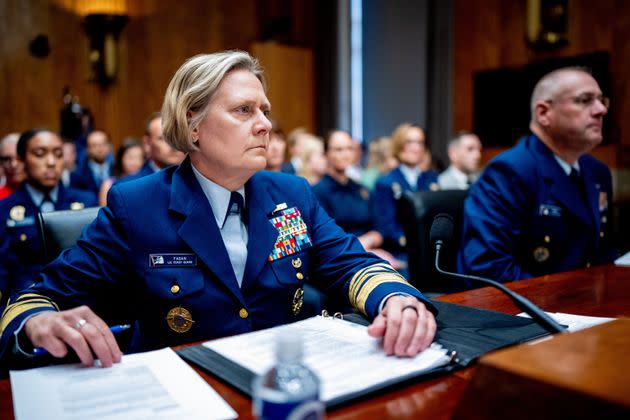U.S. Coast Guard Lied To Hide Sexual Assault Victims From Congress, Whistleblower Says
A U.S. Coast Guard Academy official resigned ahead of a congressional hearing for Coast Guard leaders this week, alleging that she was instructed to lie to past victims of sexual assault at the academy to prevent Congress from learning about their experiences.
“The Coast Guard deceived me into violating a basic principle of my profession, which is to never lie to victims,” Shannon Norenberg, who served as the sexual assault response coordinator at the Coast Guard Academy since 2013, wrote in a blog post announcing her resignation Sunday.
Norenberg said she hoped to right a wrong and publicly apologize to the victims she says she misled after she was called in 2018 to assist the Coast Guard’s Operation Fouled Anchor investigation, which secretly examined and documented years of harassment and assault allegations within the military branch.

“The whole thing was a cruel coverup at the expense of the victims, with the entire purpose being to preserve the image of the Coast Guard and avoid scandal,” Norenberg wrote. “And the Coast Guard used me as part of their plan.”
The final Fouled Anchor report reached a similar conclusion, stating that the Coast Guard’s leadership placed more importance on protecting the Academy’s reputation than on the welfare of the victims. Most of the perpetrators were found not to have been criminally investigated for dozens of cases of alleged sexual assault or harassment at the Coast Guard Academy in Connecticut over nearly two decades.
The commandant of the U.S. Coast Guard, Adm. Linda Fagan, took questions before Congress on Tuesday about Norenberg and Operation Fouled Anchor, which was first exposed to the public last summer by CNN.
Fagan, who started leading the Coast Guard in June 2022, said she had not read Norenberg’s statements, but said they will be included in an investigation by the Department of Homeland Security Office of Inspector General. Fagan also praised Norenberg as making an “incredible difference” with her work at the academy.

A representative for the Coast Guard Academy confirmed Norenberg’s resignation to HuffPost, which they said was given verbally on May 20. They declined further comment.
In her blog post, Norenberg, who became the academy’s first full-time sexual assault response coordinator when she was hired, said she was called to aid the investigation under what she now believes were false pretenses.
She was told that she would be helping past sexual violence victims whose cases “had been potentially mishandled by the Command,” and that she’d be working toward strengthening the academy’s handling of future sexual violence allegations.
“My job was to assure the victims that we were doing things differently now, and that some good had come out of what they had endured during the investigation,” she wrote.
Norenberg said she was instructed to offer to meet with past victims face-to-face, as part of a kind of “apology tour,” and to enter their case information into the Defense Sexual Assault Incident Database, a military-wide sexual assault case management system. She would also provide the victims with an official form, called a CG-6095, to report sexual assault.
Coast Guard leaders deliberately withheld VA military sexual trauma benefits and services from the survivors we were sent around to meet with. Worse, we offered them absolutely nothing to replace those lost benefits and services.Shannon Norenberg, former Coast Guard Academy sexual assault response coordinator
Completing this form, she said, would create proof that the assault was reported to the Coast Guard, and would make it easier for survivors of military sexual trauma, or MST, to obtain services from the U.S. Department of Veterans Affairs to help them recover.
If the forms were signed and given back to her, she said she’d be legally obligated to enter the cases into DSAID for 2019, the year the victims were interviewed. This is why she believes she was ultimately told not to share the forms, as an influx of cases would likely have caught the attention of Congress and led to the discovery of Operation Fouled Anchor.
“To prevent Operation Fouled Anchor from being discovered by Congress, Coast Guard leaders deliberately withheld VA military sexual trauma benefits and services from the survivors we were sent around to meet with,” she wrote. “Worse, we offered them absolutely nothing to replace those lost benefits and services. We just left the victims to fend for themselves.”
Norenberg also said she was given printed instructions to falsely tell the victims that the Coast Guard had briefed the Department of Homeland Security and Congress about their investigation, and that they expected the findings would become public.
A Coast Guard spokesperson told HuffPost that those instructions do not accurately depict how the victim interviews were to be conducted, and that another former Coast Guard member, who was present at all of the meetings, has said that the issue of congressional notification was never brought up.
“Furthermore, the Coast Guard is not aware of anyone telling members of that team to lie regarding any aspect of Operation Fouled Anchor,” the spokesperson said in an email.
Norenberg told CNN that although she can’t recall all of the details about her instructions, or her exact conversations with the victims she met with, she would have notified lawmakers immediately if she’d learned that Congress was not aware of what was happening.
“Why would anyone trust anything the Coast Guard has to say about Operation Fouled Anchor at this point?” she said.
Need help? Visit RAINN’s National Sexual Assault Online Hotline or the National Sexual Violence Resource Center’s website.

